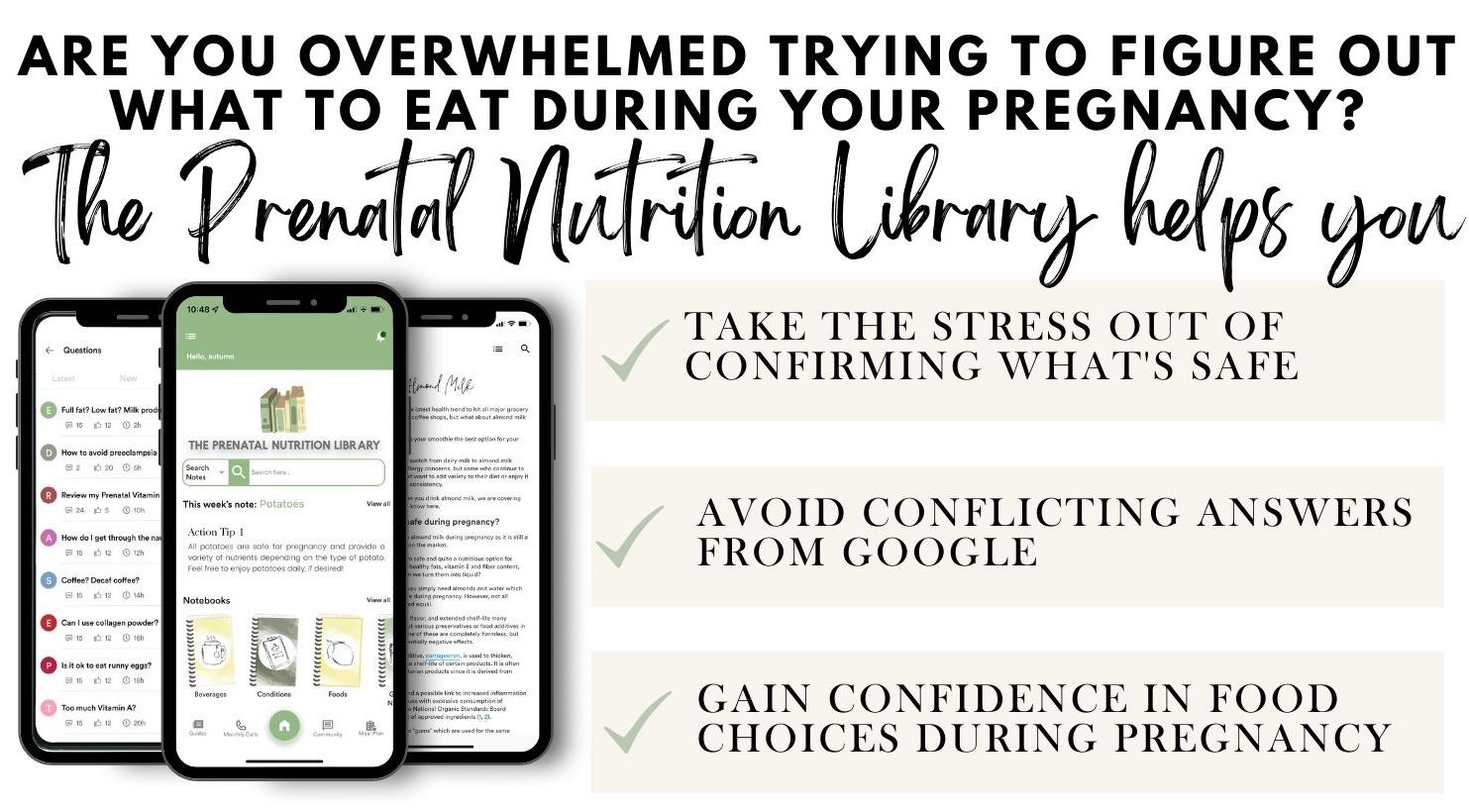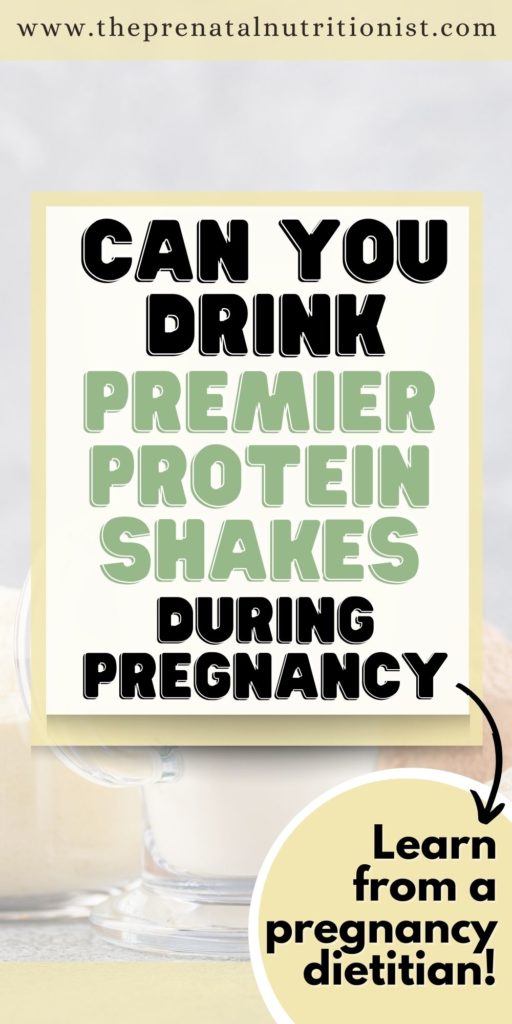
Protein is a crucial part of a balanced diet for overall health, especially when it comes to pregnancy. This nutrient helps to support maternal well-being and fetal growth and development. It has many functions that support a healthy pregnancy. Protein provides the literal building blocks of your baby’s tissues, organs, and muscles! This is arguably the most critical macronutrient we need to consume during pregnancy.
Everyone has unique needs, but most people are under-consuming protein during pregnancy, and their needs increase as they progress through pregnancy. Examples of foods that contain protein include meat, poultry, fish, eggs, dairy, beans, and nuts. However, getting proteins from these sources can sometimes be a challenge for pregnant women, possibly due to food aversions, nausea, morning sickness, dietary restrictions, or other reasons.
This is where protein shakes often enter the conversation. As a protein supplement, they help mothers with an easy way to increase their protein intake, which is often well-tolerated when morning sickness hits. Protein shakes have become popular for expectant mothers aiming to support their pregnancy nutrition goals. With Tiktok raves, Premier Protein Shakes are among the most popular brands.
In this post, I will examine protein shakes in general, including Premier Protein Shakes, and whether or not they are safe to drink while pregnant.
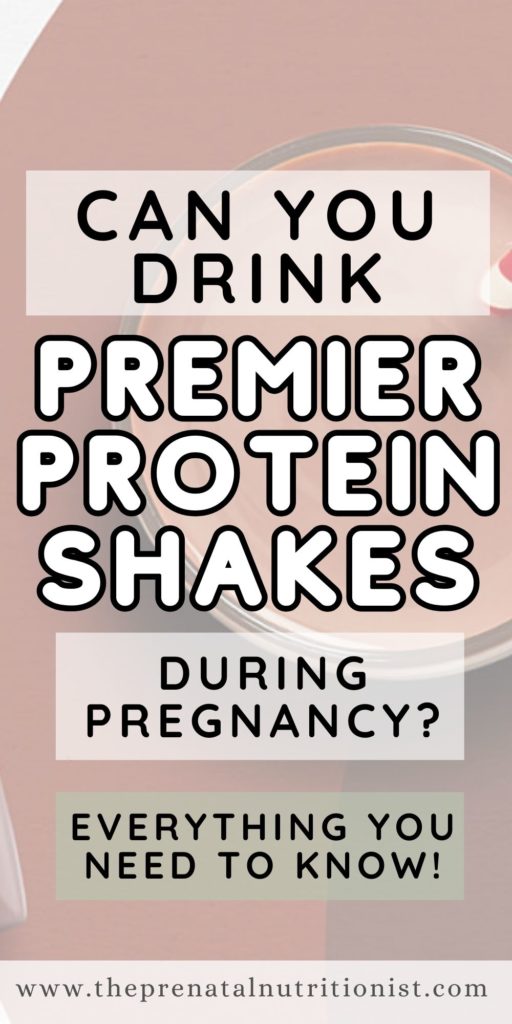
Can You Drink Premier Protein Shakes While Pregnant?
Good nutrition, which includes meeting protein needs, is essential during pregnancy. The foods you eat during pregnancy impact your health and nourishment and provide nutrients for the baby’s growth and development. What a person eats during pregnancy helps to nourish the growing child as it crosses through the placenta to the fetus.
Consuming a balanced, nutrient-rich diet is essential during pregnancy. Protein shakes offer a quick and convenient way to help meet protein needs. But are they a safe option?
It’s not as simple as giving a black-and-white “yes” or “no” answer. There are hundreds, if not thousands, of brands of premade protein shakes on the market, with varying ingredients. Some are safe options for pregnancy, while others may be safest to skip.
Reading the ingredients and nutrition facts on products is crucial to making informed choices about products before consuming them. That’s why we will delve into the accurate details of Premier Protein Shakes to provide the necessary context for examining their safety and potential benefits during pregnancy.
What Are Premier Protein Shakes?
Premier Protein Shakes are a popular brand of pre-made protein drink commonly found on store shelves. Each 11-ounce bottle or carton contains 30 grams of protein from milk protein concentrate and calcium caseinate. They also contain added vitamins, minerals, artificial sweeteners and flavors, and sunflower or soybean oil. Premier Protein Shakes come flavored in many options like chocolate, vanilla, salted caramel popcorn, and cafe latte to appeal to various taste preferences.
Compared to other protein drink products, Premier Protein Shakes offers a good amount of protein per serving. However, they also contain artificial sweeteners like acesulfame potassium and sucralose. These may not be ideal for overall health when consumed regularly, including during pregnancy.
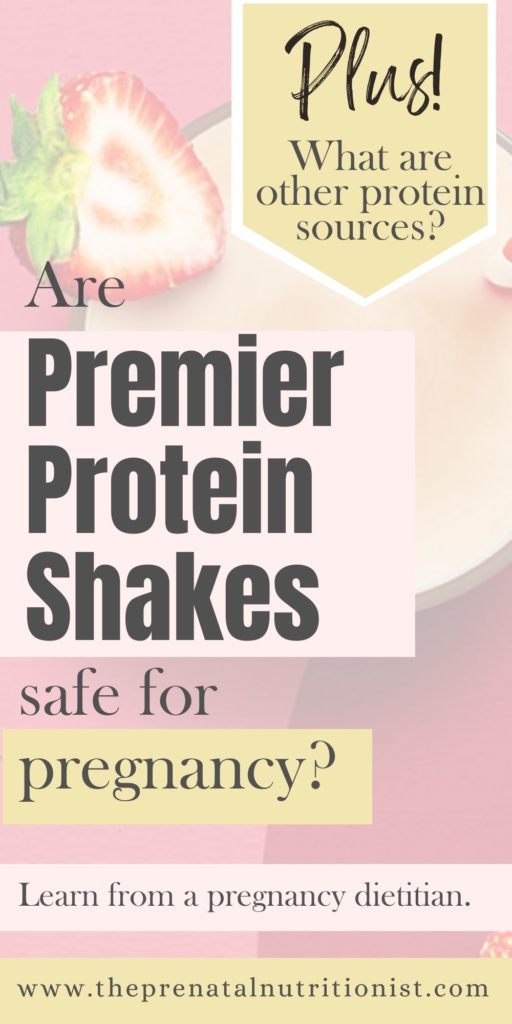
Are Premier Protein Shakes Safe During Pregnancy?
The short answer is that they aren’t necessarily “unsafe” or “toxic,” but Premier Protein Shakes are not the “most” ideal option for regular consumption during pregnancy. While it is true that you must get adequate protein during pregnancy, both for the developing fetus and yourself, Premier Protein Shakes might not be the best way to do that. This is primarily because they contain some ingredients that aren’t particularly nourishing for our health or baby’s.
Specifically, Premier Protein Shakes contain acesulfame potassium and sucralose as artificial sweeteners. These sweeteners may negatively affect gut bacteria and thyroid function—two factors crucial to regulate while nurturing a growing baby.
It’s also important to be cautious about protein shakes that add vitamins and minerals, like Premier Protein Shakes. Especially if consuming these regularly and in conjunction with a prenatal vitamin or other supplements. It’s important to double-check that nothing is being overdone. For example, vitamin A (in its retinol form) is a nutrient with an upper limit. While it’s important for pregnancy, it is possible to get too much.
While it may be okay to drink Premier Protein Shakes as a prenatal protein supplement here and there, I’d recommend an alternative for a regular choice. OWYN, Koia, Iconic, Needed collagen, or one of these homemade Protein Shakes for Pregnancy could be a good swap.
Of course, food first, like one of the following protein sources, is always a good idea! No supplement can replace the various vitamins, minerals, fiber, and antioxidants we get from food.
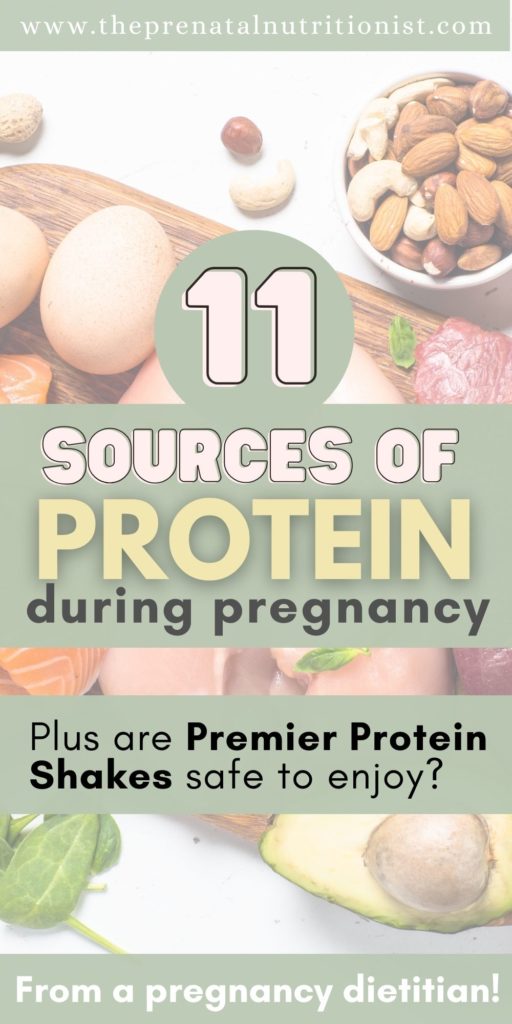
11 Good Sources of Protein For Pregnant Women
Eggs
Eggs are rich in vitamins, minerals, and protein, supporting a happy and healthy pregnancy. They help promote the baby’s overall development, especially the baby’s brain development. Due to the high amount of choline found exclusively in the yolk, eggs also help to reduce the risk of neural tube defects. They are an excellent source of protein to give expectant mothers a much-needed energy boost first thing in the morning or for an afternoon snack.
Greek Yogurt
Greek yogurt is considered very pregnancy-friendly. A single 6-ounce serving of Greek yogurt packs approximately 15-20 grams of protein. This does vary depending on the brand. It is also a good source of healthy fats, calcium, probiotics, phosphorus, potassium, folate, and zinc. I recommend choosing full-fat dairy during pregnancy.
To learn more about the difference between folate and folic acid in pregnancy, check HERE.
Salmon
Only 3 ounces of salmon delivers over 20 grams of protein and heart-healthy omega-3s known to benefit fetal brain and eye development. With a rich taste, low mercury, and tons of nutrients, salmon is a super beneficial fish to consume during pregnancy. This fish is also a fantastic omega-3 fatty acids DHA and EPA source. As well as vitamins A and B12, potassium, selenium, and magnesium.
If you are wondering more about the safety of salmon while pregnant, for an informed answer, check HERE.
Nuts
Both nuts and seeds provide an awesome boost of protein, fats, and other essential vitamins and minerals. They also make a super healthy snack idea during pregnancy! Peanuts, cashews, walnuts, and almonds are great options that could be added to your pregnancy diet. A 1/4 cup of nuts gives 4 to 9 grams of protein per serving.
Lentils
Lentils are in the legume family because they produce seeds in pods. There are a variety of types of lentils, and they are a super nutritionally dense food. They are packed with a plethora of essential vitamins and nutrients that are important for both mom and baby’s health, growth, and development. In addition to plant-based protein, lentils contain fiber, thiamine, niacin, folate, zinc, non-heme iron, and more! Lentil soup or lentil-based pasta dishes can be a great choice when pregnancy aversions and nausea strike.
Beef
Beef is a complete and super beneficial source of protein for pregnancy! It’s a top food choice for supporting the growth and development of both mother and baby during pregnancy. Beef is packed with essential nutrients like heme-iron, zinc, and B vitamins.
It offers expectant mothers the energy and nourishment needed to fulfill the demands of pregnancy. The versatility of beef in cooking allows for its incorporation into an array of flavorful dishes. This ensures that pregnant women can savor both the nutritional benefits and the culinary delights of this wholesome food throughout their pregnancy journey.
Protein Bars
Some of you may be wondering, are protein bars safe during pregnancy? The answer is yes… they can be! However, there are some considerations to remember when choosing a protein bar to ensure maximum benefits and minimize added sugar intake. Depending on the brand, a bar may give 8 to 20 grams of protein per serving. It can be a good protein boost on the go or in a pinch.
We also have a protein bar for pregnancy guides inside The Prenatal Nutrition Library App if you want to ensure you pick an ideal option for pregnancy.
Tuna
There are lots of myths about eating tuna during pregnancy. The truth is that if you enjoy tuna, avoiding it all together during pregnancy is not necessary. There are many varieties of tuna. Ahi tuna is high in mercury and best avoided during pregnancy. However, skipjack or “light” canned tuna varieties are low in mercury and an excellent choice for pregnancy. These types of tuna are a quick, easy source of protein and nutrients like omega-3s, vitamin B12, and selenium.
Chia seeds
Chia seeds are a great addition to a healthy breakfast during pregnancy, including stirred into overnight oats, yogurt, smoothies, or even made into a delicious chia seed pudding. It’s not as rich in protein as meat and seafood, but it does provide a nice boost when battling aversions. An ounce of chia seeds gives about 5 grams of protein. Besides adding a few grams of protein to your diet, chia seeds are also a good source of non-dairy calcium, fiber, magnesium, non-heme iron, antioxidants, and healthy fats!
Protein Powder
As discussed in this article on “Is Protein Powder Safe for Pregnancy,” protein powders, including varieties of whey protein, pea protein, or hemp protein, can be part of a pregnancy nutrition plan with a few exceptions and considerations. Again, it’s always best to consume food first, but protein powders can be valuable to help meet needs.
For an extra protein boost, throw one scoop of pregnancy-safe protein powder into a smoothie or liquid of your choice and drink up! Need some smoothie inspiration? Try one of these green smoothies for pregnancy!
Higher protein vegetables
Vegetables aren’t going to be your richest source of protein! However, some veggies pack in a few more grams of protein than others and can boost your overall intake. Especially if dealing with a meat aversion. Of course, there are many other reasons to eat vegetables during pregnancy, like fiber. They are also rich in other nutrients that are good for mom and baby. Green peas, brussels sprouts, asparagus, and broccoli are among some of the higher protein vegetable choices.
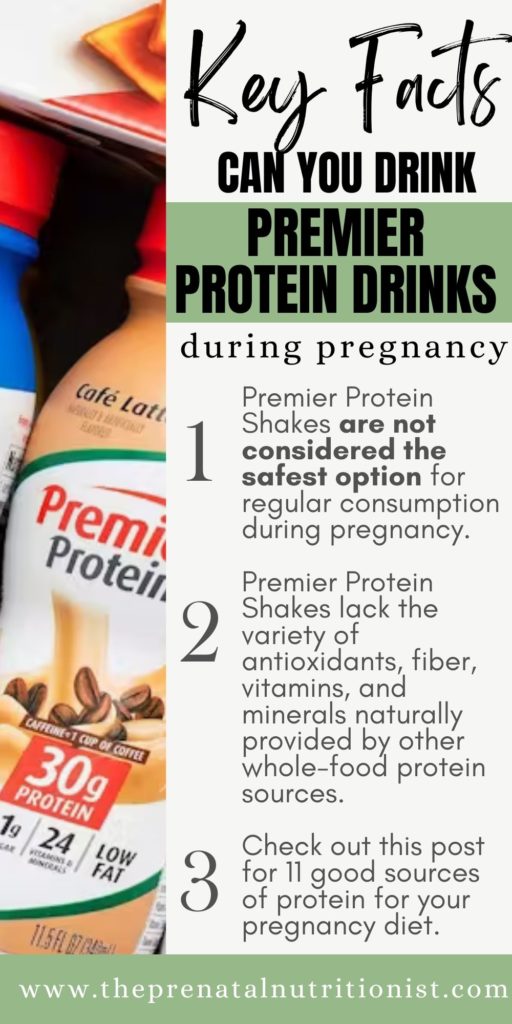
While we encourage food first, with a few considerations, protein shakes can be a convenient option to help meet protein needs when nausea or aversions strike.
Whenever possible, focusing on whole foods like poultry, meat, seafood, and plant-based protein options is key. These foods offer an array of important vitamins, minerals, fiber, and protein. While protein shakes can be a supplement, they cannot replace or replicate what we get from whole foods. With that said, protein shakes can be very valuable to help meet needs, especially when battling morning sickness.
To learn more about determining and meeting protein needs during pregnancy, check out our protein guide, The Prenatal Nutrition Library!
The Prenatal Nutrition Library was built to help you feel confident in your food choices for two. In the library, we provide examples of protein powders and shakes, tips on what to look for and avoid, and guidance on protein requirements. You’ll have access at your fingers with our mobile app, available on both Apple and Android! Join The Prenatal Nutrition Library today!



